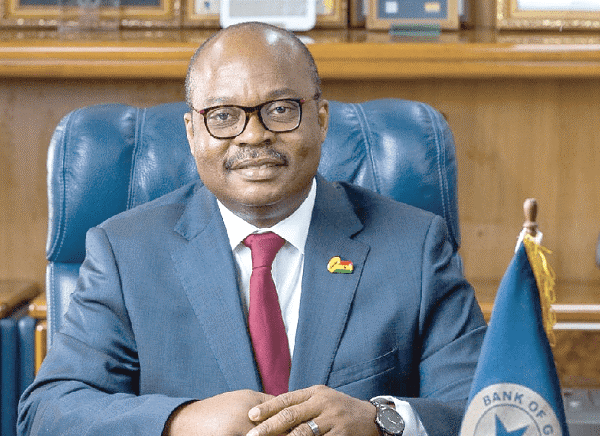The GH₵60.08 billion loss the Bank of Ghana (BoG) posted is largely responsible for the gradual return of confidence in the financial system, stabilizing inflation and the economy showing signs of recovery.
Without this, government could not have met the debt to Gross Domestic Product (GDP) threshold for the approval of the International Monetary Fund (IMF) bailout programme.
The hard truth is that the signing of the IMF bailout programme is what is helping the economy show signs of recovery
State of the economy in 2022
The year 2022 was the peak of economic and social crisis in Ghana and without the intervention of BoG, the economic would have crashed by now.
The unimaginable negative impact of a crashed economy on all Ghanaians would have been more disastrous than experienced in 2022.
Making losses may therefore be perfectly compatible with a central bank’s remit of ensuring the smooth functioning of the economy.
Therefore, the intervention of BoG should rather be seen as a commitment to the highest standards of prudent management, governance, transparent accounting and audit practices in the interest of all Ghanaians.
Fiscal overruns and debt distress
A culmination of fiscal overruns and debt distress resulted in Ghana losing access to both international and domestic markets.
Rating agencies then downgraded Ghana to junk category with huge macroeconomic imbalances.
The cedi depreciated sharply from GH₵6 to the dollar at the end of 2021 to almost GH₵13.1 to the dollar at the end of November 2022 until it came down to about GH₵8.57 to the dollar at the end of December 2022 resulting in about 30% on a year-on-year basis and averaged 31.13%.
Similarly, inflation rose from an average of 12.62% at the end of December 2021 to 54.14% at the end of December 2022.
These developments had a significant impact on the operations of the Bank and every other entity in the country.
There was a clear mismatch between revenue inflows and expenditure financed in 2020 by exceptional support from the IMF and World Bank resources, and in addition to financing from the Bank of Ghana through the issuance of the GH₵10 billion Covid-19 bond.
As a result, sovereign spreads on Ghana bonds widened, signalling investor dissatisfaction with the stance of fiscal policy.
The 2022 Budget which was read in 2021, did not address fiscal concerns as the it was even more expansionary by about 23% with a raft of revenue measures to raise financing.
Credit Rating downgrades
As a result, the Credit Rating Agencies further downgraded Ghana’s sovereign debt rating, which blocked Ghana’s access to international capital market borrowing.
This triggered a liquidity crisis, spilling over into a balance of payments crisis.
External and domestic payments needed to be made, the domestic auction was failing, and BoG had to step in to arrest a major economic and social crisis.
$500m reserves lost in 2 months
In two months, the Bank of Ghana lost $500 million in reserves and built significant overdraft with the government as a result of the auction failures.
Unsustainable path of the economy
It became clear that Ghana was on a path that was unsustainable, and the government had to approach the International Monetary Fund (IMF) for support in July 2022.
The IMF process included putting into place a credible programme of reform, which included restructuring of the total government debt to sustainable levels.
Until Staff Level Agreement with the IMF was reached in December 2022, the Bank of Ghana had to continue to provide the necessary support to keep the economy running.
Domestic Debt Exchange
A major plank of the corrective action required for the IMF programme was the Domestic Debt Exchange, where the stock of government debt was to be halved from 105% of Gross Domestic Product (GDP) to 55% by 2028.
The holders of Government debt had their debt instruments exchanged for new ones with lower interest payments and longer terms.
The outcome of DDEP shows that the threshold of 55% of GDP was not met.
BoG therefore acted as a loss absorber used to close the gap to enable Ghana meet the debt threshold that qualified Ghana for the IMF programme.
This means the Bank of Ghana had to absorb a 50% haircut on its non- marketable holdings of Government debt instruments.
Breakdown of BoG’s losses
This singular act led to significant impairment losses of GH₵32.3 billion to the Bank’s accounts.
Impairments of marketable instruments also accounted for another GH₵16.1 billion, bringing the total impairments of government holdings to GH₵48.4 billion.
As experienced by central banks globally, price and exchange rate movements led to a loss of GH₵S5.2 billion while impairments of Ghana Cocoa Board (COCOBOD) loans amounted to GH₵4.7 billion.
These are the reasons BoG reported a loss of GH₵60.08 billion in 2022 resulting in GH₵55.1 billion negative equity.
Normally, when profits or losses of institutions are declared, they are posted to a General Reserve Fund Account.
The equity also known as shareholders funds is defined to include the minimum stated capital and General Reserves. In this instance, the GH₵60.8 billion loss was posted to the general reserve account which had some positive balances.
GH₵55.1bn negative equity
The loss, together with the positive balances in the General Reserve Account resulted in an overall negative equity of GH₵55.1 billion.
Insolvency means inability to pay one’s debts. It may take the form of cash flow insolvency or lack of liquidity, in which the central bank cannot pay its debt as they fall due.
In the case of negative equity, what it basically means is that central bank’s liabilities exceed its assets.
A central bank policy solvency is the ongoing ability of the central bank to fund and implement operations in line with the policy aims for which it has independent responsibility without recourse to the government.
Policy solvency requires sufficient realized revenues to cover costs and to build longer-term capital reserves allowing for independent and appropriate policy decisions.
Inability to cover costs and build sufficient buffers over the long term may require capital injection from the government which can undermine its independence and credibility of monetary policy and also affect public confidence in the central bank’s operations.
Therefore, although the financial position of the central bank has no immediate impact on its ability to pursue the policies it deems appropriate, its equity and its earning capacity should be high enough in the long-run to ensure that it is sufficiently financially independent of the government.
Although the financial position of the central bank has no immediate impact on its ability to pursue the policies it deems appropriate, its equity and its earning capacity should be high enough in the long-run to ensure that it is sufficiently financially independent of the government.




